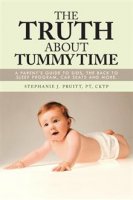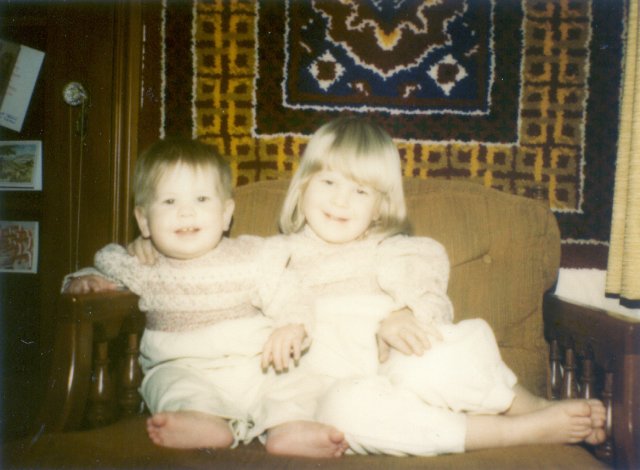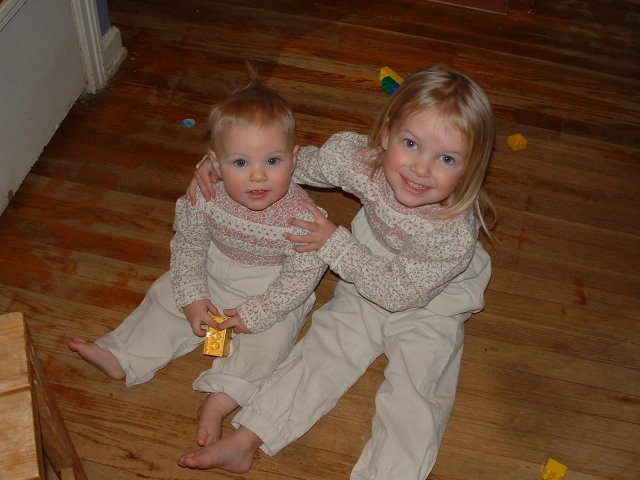Edy's Double Fudge Brownie Ice Cream, Butterfingers, and their Swiss pedigree notwithstanding, Nestlé is not my favorite company. They drain Florida's aquifer and sell our water out of state, while we suffer water restrictions and salt-water intrusion problems. (Not that they're the only ones.) They aggressively promote their infant formula in impoverished countries, where babies especially need the benefits of breast milk, and where improperly-prepared formula can be deadly. They market sugar and chocolate to toddlers:
(I found this on the grocery shelves on a visit to Switzerland. If you click on the picture to enlarge it, you'll see it is intended for children ages one to three.)
I guess if they're criticized for selling baby formula to the poor, we shouldn't complain if they turn their marketing skills toward the rich. Still, Nestlé's attempt to bring their fabulously successful and oh-so-trendy capsule coffee system to the baby bottle set strikes me as over the top. As my Swiss informant explained: Capsule coffee machines are all the rage here and if you have a Nestlé machine you're in the top of coolness. Now you can get one for your baby, only it serves formula not coffee.
Yes! It's safe, it's foolproof, it's BabyNes!
BabyNes is the world’s first comprehensive nutrition system for infants and toddlers, and is based on Nestlé’s latest scientific achievements in baby nutrition and systems technology. With BabyNes, Nestlé builds on its unmatched expertise in baby nutrition gained over 145 years since the invention of Farine Lactée by Henri Nestlé.
Ahem. The world's first comprehensive nutrition system for infants and toddlers is actually as old as mammals....
BabyNes offers single-serve formulas for infants and young children up to the age of three years. The composition of the six consecutive formulas meets the evolving nutritional needs in the first three years of life: four formulas in the first year, and one formula for each of the following two years. The customised composition of these products is tailored to suit the growth pattern in early life and the baby’s changing nutritional needs, while taking into account the steady introduction of solid food into the infant’s diet.
The single-serve portions are sealed in capsules, used in the proprietary BabyNes machine, which recognises each capsule and prepares the bottle with precisely the right dosage and temperature, at the push of a button, in less than one minute. The BabyNes machine combines state-of-the-art technology with the utmost safety and convenience, and ensures a hygienic, quick and easy bottle preparation.
Best of all, it's supercool! (Even cooler because the demonstration is in French.)
Permalink | Read 4915 times | Comments (11)
Category Children & Family Issues: [first] [previous] [next] [newest]
Until June of 2010, homeschooling was legal in Sweden, albeit within some onerous regulations. But with the passage of a comprehensive revision of the education system, the right of parents to direct the education of their own children has been virtually abolished, in apparent violation of the European Convention on Human Rights, Protocol 1, Article 2:
No person shall be denied the right to education. In the exercise of any functions which it assumes in relation to education and to teaching, the State shall respect the right of parents to ensure such education and teaching in conformity with their own religions and philosophical convictions.
If you want to become depressed learn more, there are many stories, often heart-wrenching, at the Home School Legal Defense Association site. (I may have some quarrels with the HSLDA's approach, left over from the early days of homeschooling, but that doesn't negate their importance as a source of homeschooling advocacy and information.)
As part of an effort to raise awareness of their plight, Swedish homeschoolers are staging a Walk to Freedom from Askö, Sweden to the Finnish island of Åland, to which many Swedish homeschooling refugee families have fled. (No, they're not walking on water, but plan to secure the help of a ferry for the last leg.) Their adventure begins tomorrow.
I'm not sure what to think of the latest buzz that sitting for more than three hours a day takes two years off your life, particularly such statements as, "Sitting, it turns out, can shorten life expectancy almost as much as smoking can." As with many such generalized studies, I think it's making its splash long before there has been sufficient time for analysis and confirmation or contradiction. Be that as it may, it's clear enough that the human body is more designed for movement than for sitting on our hind ends for extended periods.
The articles I've read about this new study recommend that we watch less television, cut down our computer time, and walk to a colleague's office rather than sending an e-mail. Only the first is at all practical for those whose work involves the computer, and whose colleagues may be half a world away. Our hope, I assume, lies in taking frequent breaks to get up and move around, although the value of such behavior may be hard to sell to an employer who is more worried about productivity than longevity.
But as long as they're considering impracticalities, I'm puzzled by the obvious omission in the articles: Not one has addressed the long hours our children spend sitting in school, with less freedom of motion than an office worker with a swivel chair and the ability to walk at will to the bathroom. When was the last time you heard a serious suggestion to keep school time to under three hours? (Besides here, of course.)
Worse still, consider what we do to our children before school: The hours tightly bound in car seats, or confined in other devices, aka baby shackles. Little time spent on their tummies learning to become mobile. Day care and early school where mobility is discouraged in the name of education or just plain crowd control.
No wonder we don't care to get off our duffs.
I have so many things to write about, but am feeling a time crunch at the moment. Just so you know I haven't forgotten you altogether, you get someone else's comments on homeschooling, in the form of a First Things article by Sally Thomas. (H/T Conversion Diary). Warning: it may be a little intimidating if you happen to be feeling a bit insecure about your own homeschooling days. But it's worth reading for the inspiration.
In recent years, as homeschooling has moved closer to the mainstream, much has been said about the successes of homeschooled children, especially regarding their statistically superior performance on standardized tests and the attractiveness of their transcripts and portfolios to college-admissions boards. Less, I think, has been said about how and why these successes happen. The fact is that homeschooling is an efficient way to teach and learn. It's time-effective, in that a homeschooled child, working independently or one-on-one with a parent or an older sibling, can get through more work or master a concept more quickly than a child who's one of twenty-five in a classroom.
To my mind, however, homeschooling's greatest efficiency lies in its capacity for a rightly ordered life. A child in school almost inevitably has a separate existence, a “school life,” that too easily weakens parental authority and values and that also encourages an artificial boundary between learning and everything else. Children come home exhausted from a day at school—and for a child with working parents, that day can be twelve hours long—and the last thing they want is to pick up a book or have a conversation. Television and video games demand relatively little, and they seem a blessed departure from what the children have been doing all day.
At home we can do what's nearly impossible in a school setting: We can weave learning into the fabric of our family life, so that the lines between “learning” and “everything else” have largely ceased to exist. The older children do a daily schedule of what I call sit-down work: math lessons, English and foreign-language exercises, and readings for history and science. The nine-year-old does roughly two hours of sit-down work a day, while the twelve-year-old spends three to four hours. But those hours hardly constitute the sum total of their education.
[W]hat looks like not that much on the daily surface of things proves in the living to be something greater than the schedule on the page suggests, a life in which English and math and science and history, contemplation and discussion and action, faith and learning, are not compartmentalized entities but elements in an integrated whole.
Until Janet wrote a post that tops everything, this celebration of mothers from Lenore Skenazy was my favorite Mother's Day article. It's still great. I present some excerpts, with love, for all of my favorite mothers.
Time out from America’s favorite spectator sport: Mommy bashing. Mommies who “ignore” their kids. Mommies who “smother” their kids. Mommies who do what mommies have done since the beginning of time—their gosh-darn best. And yet, according to some onlooker somewhere (often one with air time to fill), that’s just not good enough.
We worry that one false move—a harsh word, a broken promise, perhaps a non-Paul Newman sandwich cookie—could cause a lifetime of pain. This worry is reinforced by a tsunami of parenting “resources” telling moms how to do everything just right: the right books, words, classes. I’ve seen whole articles on which sand toys to buy. The corollary is blame: If moms don’t do all those things (and spend all that time and waste all that money), their kids will be losers. And it’s all their fault.
That message is why mothers are getting the short end of the rattle. It’s a message that says there’s some secret recipe for raising great kids and anyone not following the recipe is doing it WRONG.
But you know what? Most moms, whether working or not, breastfeeding or not, are doing a great job. They hug their children. They kiss the boo-boo, they get the kids fed. And if it’s a Hot Pocket instead of broccoli rabe…so what?
There ISN’T a secret recipe for childrearing, there’s only the basic ingredient: Love. Most moms have it in spades. It’s who they are. So don’t keep telling them what they’re doing wrong.
Thank them for getting the biggest thing right.
Permalink | Read 2501 times | Comments (2)
Category Children & Family Issues: [first] [previous] [next] [newest]
It was almost an idyllic scene: Three adults, eight children—four boys, four girls, ages 9, 8, 7, 5, 3, 3, 14 months, and 6 months—and one playground all to ourselves.
Well, almost all to ourselves. As the children happily ran back and forth across the grounds, it was more than a little annoying to remind them to watch out for the maintenance cart that came back again and again to ... to what?
The first time, the driver was apparently cleaning up branches from a recent storm, though he spent most of his time making worried comments about the exuberantly-climbing 14-month-old and glaring at the three adults who clearly weren't doing their duty in keeping her off the dangerous equipment. "There's an open space up there she could fall through, you know!" Yep, she could have fallen, I suppose, but she's part monkey, part mountain goat, and part bulldozer, so none of us saw any reason to spoil her fun. "Open space" or not, this playground is as safe as it can get without being of no use at all. Since the days when our children played there, we've lost the merry-go-round, the high, curly slide, and a lot of climbing equipment that was far more interesting ("dangerous") than that which replaced it.
The boys had ridden their scooters into the park, and dropped them right on the sidewalk as they ran off to play on the equipment. We'd left the scooters where they lay, because no one else was in the park to be bothered by them. When the maintenance cart came by, I quickly moved them out of his way. "Do you know whose scooters those are?" "Yes; they're ours." "Riding scooters in the park is forbidden." "Okay, I'll let the kids know." We meekly obeyed, though I can't imagine why he found it necessary to enforce the rule. Did I mention we were the only ones in the park?
Finally, the man drove away. But like the famous cat, he kept coming back. Driving slowly through the park, peering suspiciously at the children's antics, then leaving, only to repeat the process a few minutes later. In other circumstances I would have been tempted to call the police! But I'm sure he only meant well, and just wanted to be available when one of the frolicking youngsters suffered an injury, since the adults were clearly irresponsible, chatting away among themselves while the children chased each other up and down and all around.
Everyone had a wonderful time—except possibly the maintenance man, and who knows? maybe he was satisfied in a perverse sort of way for having prevented a scraped-knee scooter injury. But the experience did leave me slightly disturbed.
Reading the Free-Range Kids blog, I've heard plenty of stories of how schools, governments, playgrounds, social service agencies, and other institutions have joined "helicopter" parents in a culture of fear that deprives today's children of the opportunities they need to develop into strong, competent, independent adults. But this was my first personal experience with the phenomenon, and it was somewhat of a shock.
Permalink | Read 2949 times | Comments (1)
Category Children & Family Issues: [first] [previous] [next] [newest] Everyday Life: [first] [previous] [next] [newest]
Celebrating a Simple Life has a perceptive post this morning. Ostensibly, it's about giving meaningful praise to children's artwork, but I say her wisdom has a much wider application, for chldren and adults in all areas of life. Read the whole thing; it's worthwhile, it's short, and it shows a great picture painted by her son.
When you give meaningless praise, your kid comes to expect it for every not-so-impressive act they perform. It's exhausting to the parent, becomes meaningless to the child, and sets up a bad habit of being forced to praise mediocrity, with your child knowing full well that the praise is hollow.
When you describe what you see, you are telling the child your work is worth examining more closely. You are encouraging language development through your description. You are teaching your child to have a critical eye for their own work. And then when you do offer praise, your kid knows they deserved it.
(Apologies, to those who care, for publishing the awkward gender-neutral but grammar-offensive language. The content is worth getting past that.)
I'm convinced that non-specific praise in any area, for child or adult, usually does more harm than good. It means we're not taking them or their work seriously. It means we're too lazy (tired, busy, etc.) to do our own job right. And it sets up children, especially, for failure in the long run: when praise is unrelated to the quality of the work, how can they improve? When a five-second scribble receives the same fulsome admiration as a 30-minute effort, how do they learn that persistence and hard work make a difference?
That's not to say that it isn't important to convey to our children (and others) that we love them because of who they are, not because of what they do. I'm not advocating conditional love. But when commenting on work done, specific and meaningful praise is what both feeds the heart and encourages more and better efforts.
 I haven't read the book myself, but was thrilled to find this review of The Truth about Tummy Time: A Parent's Guide to SIDS, the Back to Sleep Program, Car Seats and More by pediatric physical therapist Stephanie J. Pruitt. It's about time someone from the medical profession admitted that Back to Sleep has led to a significant rise in physical problems and developmental delays in our children.
I haven't read the book myself, but was thrilled to find this review of The Truth about Tummy Time: A Parent's Guide to SIDS, the Back to Sleep Program, Car Seats and More by pediatric physical therapist Stephanie J. Pruitt. It's about time someone from the medical profession admitted that Back to Sleep has led to a significant rise in physical problems and developmental delays in our children.
What I find especially interesting is that Back to Sleep is only part of the problem. See this article, Shackles for Babies, particularly the comments that follow from another pediatric physical therapist. Babies are being left on their backs during the day as well as at night, despite the known value of "tummy time." What's much worse, many are kept for hours on end in baby entertainment devices and rigid baby carriers that keep them in unnatural positions and do far more damage than leaving them on their backs, but free to move. Scary.
Even the strictest adherents of Back to Sleep can make a point of giving their babies freedom to move the rest of the hours of the day.

The Stories of Emmy: A Girl Like Heidi by Doris Smith Naundorf (Xulon Press, 2010)
Doris Smith Naundorf is known in upstate New York as The Story Lady. The Stories of Emmy are taken from her one-woman play, Interweaving the Generations. Emmy, Doris's mother, grew up partly in her Swiss village of Muttenz, and partly in Paterson, New Jersey, where her family moved when she was ten years old. Her stories give a delightful glimpse into Swiss, American, and immigrant life in the early 1900's. (Grandchild warning: There is one sad incident requiring parental discretion; the stories are meant to be appropriate for chidren, but reality is sometimes harsh.)
Muttenz is near Basel (four minutes by train, a century later), and the stories are sprinkled with Baseldeutsch, the delightful Swiss-German dialect spoken there. A glossary is provided for each chapter.
Driving the several blocks to the train station, Emmy excitedly chattered to her father. "Will we get there in time, Vatti? she asked. "Mutti says we must be there early, so we will not miss the train."
"Jo, jo," replied her father. "In a country that makes such fine watches and clocks, of course the Zúúg runs on time. It is up to the passengers to be there early so the conductors can keep their schedule."
"The Zúúg, the train, is never late?"
"Of course not! We Swiss cannot even imagine such a thing!" her father assured Emmy.
I couldn't resist finding Emmy, age 20, and her family in the 1920 census. (Click on the image to view a version large enough to read. Their name, Lüscher, appears without its umlaut.)
30 Reasons Why You Light Up Our Lives
(It was hard to stop!)
- From early childhood you have loved God “with all your heart and with all your soul and with all your mind and with all your strength.”
- You were the sunniest, most joyfully enthusiastic preschooler I’ve ever known, full of smiles and laughter.
- Your positive, happy attitude is, and always has been, quickly turned to wrath in the presence of perceived injustice, to others at least as much as to yourself.
- You love your family intensely, all generations and collateral branches, and work sacrificially to promote family relationships.
- All your life you have maintained a close, loving, and respectful relationship with your parents.
- You were a totally delightful, respectful teenager, growing more and more independent without ever rejecting your parents and their values in any important way.
- You have always found learning to be the “best game of all,” whether begging for math lessons as a preschooler, crafting your own educational program as a teen, or reading and researching voraciously as an adult.
- You developed the most important skill needed to fuel a lifetime of learning (also useful for excelling in ordinary academic life): the ability—and desire—to teach yourself using whatever materials are available, from textbooks to teachers to life experiences.
- Your favorite mode of education has been what you call “learning to swim by drowning”—throwing yourself into a new situation, a new instrument, a new language, a new country; putting yourself in a situation where the alternative to learning is failure.
- Your razor-sharp intellect and grasp of logic can be counted on to ferret out faulty or slip-shod reasoning.
- Likewise, you readily admit when you are wrong, if presented with a clear, rational argument.
- You are always asking thoughtful, important questions. (And always have, much to the annoyance of certain Sunday school teachers.)
- Unlike most of us (your parents being chief offenders), you can never settle for plugging numbers into a formula or regurgitating the answer expected by a teacher, but with a dogged determination you wrestle with your studies until you truly understand the material.
- Equally determined in your relationships, you will not gloss over problems, but wrestle with yourself and others to understand and resolve difficulties.
- You are a very creative thinker; being self-taught in so many ways has made thinking outside the box second nature.
- You also live outside the box: You have become the "granola mom" I never knew I always wanted to be.
- You never conform for the sake of conforming, following the crowd only if convinced by the evidence that the crowd is right, and unhesitatingly taking the road less travelled if the evidence points in that direction.
- And you are happy to blaze a new trail cross-country if there is no road at all!
- Your sense of adventure and love of new experiences have taken your from an (unauthorized) solo exploration of the docks of Key Largo at age three, to travelling through Italy on your own, to spending a year in Japan teaching English to high school students, to graduate school (and eventually a home) in Switzerland.
- You are a talented, skilled, and highly-trained musician who demonstrates with your life that music comes alive when it is made with and/or for others.
- You waited patiently until God revealed the right man to be your husband and the father of your children; you love him intensely, respect him enormously, and delight in being the “helper suitable for him.”
- You have made your home into a place of hospitality, welcome, grace, beauty, joy, and peace (even though your lovely and lively children ensure that nothing is ever too peaceful for too long).
- You are a loving, giving, thoughtful, disciplined, and inventive mother.
- You have proven that you have the nerve and determination to push through physical and emotional pain for the sake of those you love and what you believe is right.
- You are a great teacher, with a demonstrated ability—rare in someone for whom understanding often comes quickly and easily—to see a problem from the student’s point of view, whether helping kindergarten students as a third-grader, tutoring high school students, inspiring Japanese students to enjoy the English language, coaxing enthusiasm out of young piano students, showing your mother the virtues of a “tickler” system, or feeding your own children’s “happy hunger” for learning.
- You have a good eye for seeing work that needs to be done, and a good will for jumping in and doing it.
- You are honest and trustworthy in word and in deed.
- You are careful and wise in financial matters.
- At the same time, you are generous and giving: of your money, your time, and your emotional energy.
- Your heart’s desire is to become more and more like Christ each day, and to demonstrate his love in all you say and do.
What more could parents desire?
Happy Birthday!
With lots and lots of love,
Mom & Dad
Permalink | Read 3143 times | Comments (1)
Category Children & Family Issues: [first] [previous] [next] [newest] Random Musings: [first] [previous] [next] [newest] Everyday Life: [first] [previous] [next] [newest]
I can't be griping all the time. Here's some great news for homeschoolers—and others who don't fit in the standard school model—who have suffered, as we did, from age discrimination by community colleges. Here are some excerpts from the encouraging story in tomorrow's Orlando Sentinel. (I know. Don't ask me why a column dated February 19 is available on the 18th, but it is.)
Two years ago, [Lake-Sumter Community College] refused to admit as a dual-enrollment student a then-12-year-old Center Hill girl who was more than academically qualified to study at the two-year community college. Instead of enthusiastically embracing Anastasia Megan, a brilliant young woman home-schooled by her parents, college administrators took the most backward stance imaginable and fought to keep her out.
The U.S. Department of Education's Office for Civil Rights in Atlanta, to whom Annie's family complained, recently closed the matter after LSCC eliminated its age requirement, trained employees to stop discriminating and offered Annie a chance to apply.
However, by the time LSCC offered to consider Annie in July 2011, it was clear that her course of study already had outstripped what the community college could provide. Starting in August, Annie, now 14, and another of the triplets, her brother Zigmund, will attend Queens University in Ontario, Canada. She was among 300 successful applicants to the college of business and commerce from a field of 5,000. ... Annie's brother is entering the university's engineering school (Annie's second choice), and the third triplet, Elizabeth, is enrolled in a high-school International Baccalaureate program.
[S]uch a ruling by the Office for Civil Rights is likely to have an effect on community colleges statewide. It's all about access in community colleges, and that's the way it ought to be. The Megan family neither asked for nor received a nickel in damages. The Megans didn't hire a lawyer. LSCC, however, spent about $12,000 on attorney fees fighting to discriminate against a kid whose achievements were remarkable. Asked why the college ever would fight to keep any student out, [College President Charles Mojock] said: "That was then, and this is now. We live and learn too."
After six nephews, four grandsons, and 29 years, we once again have two little girls who fit these adorable outfits. Picture credit for the second goes to Heather and Jon Daley; the first is scanned from an old, washed out Polaroid-style print, but you get the idea.
Janet and Heather, December 1982
Joy and Faith, January 2012
Permalink | Read 2544 times | Comments (4)
Category Children & Family Issues: [first] [previous] [next] [newest]
Lately it's looked a lot more like picture-perfect Switzerland, thanks to the snow and cold. Except that it could be picture-perfect New York, or Pittsburgh, or Minnesota, because even today, when the sun came out, the Alps were obscured by low clouds.
Weather or no, Joseph likes to be outside. He loves the snow, which he calls "no," except when talking to Bappe (Daddy); then he says "nee" (Swiss German "Schnee").
On our walk the other day I'd intended to get some video footage of him playing in the snow, but he kept getting distracted by airplanes and other vehicles.
What may not be obvious is why he suddenly stops in the middle: his hat catches on an overhanging branch. After breaking loose, he's a bit unhappy—until another airplane comes by.
Permalink | Read 2689 times | Comments (1)
Category Children & Family Issues: [first] [previous] [next] [newest]
Joseph has two different words for "spin." One, pronounced "pin," refers to when he, himself, is spinning. The other I haven't yet figured out how to transcribe, but it has two syllables and refers to spinning an object, like a top, a ball, a block, a coin. Whether it's supposed to be one word, or a two-word command, the meaning is clear when he hands you an object: "Spin it!" You'd be surprised at how many items that are not tops can be made to spin.
"Pin," on the other hand, can refer to being spun in someone's arms, or twirling himself around till he staggers with dizziness, or being spun on Mommy's office chair. When he does the last sitting backwards and holding on to the seat back, it can be very fast, and produces an impressive postrotatory nystagmus.
He also likes this, sitting in his space capsule (backpack) and training for NASA. The position makes up for the reduced rotational velocity. At the end he is saying and signing, "more."
This was the first video, taken nearly two weeks ago to let Dad-o know that Joseph is thinking about him even though he isn't here with us.
We love you, Dad-o!






